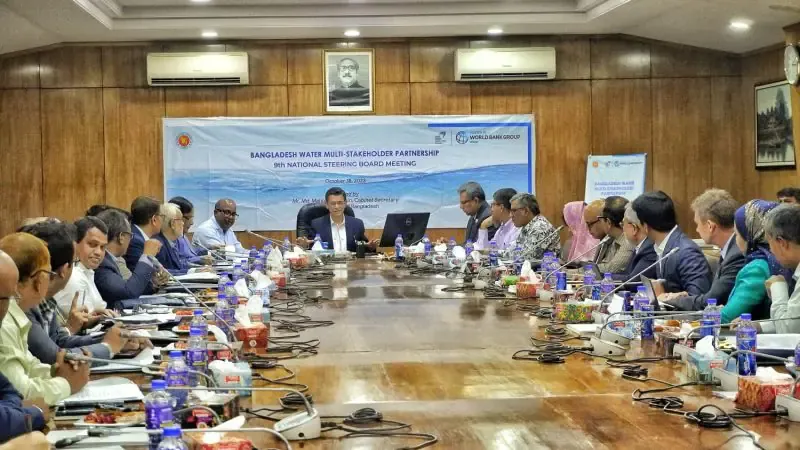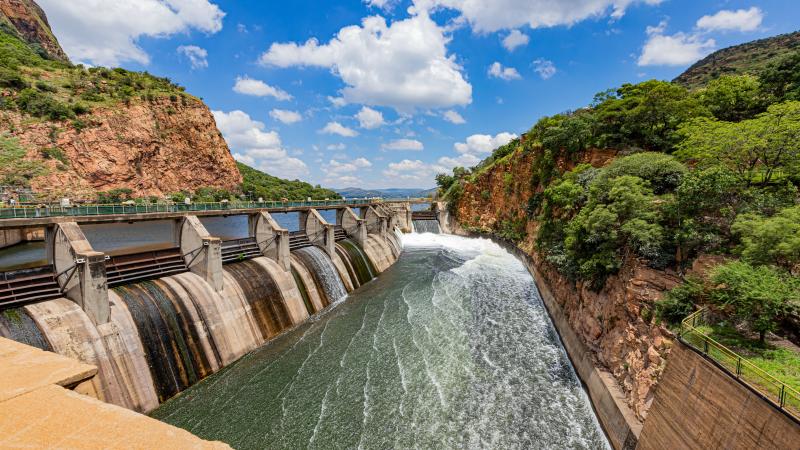Facilitate Partnerships
We create platforms that enable businesses, governments, civil society, and other water users to develop a shared understanding of water challenges. These platforms are not just discussion forums—they are structured environments where priorities are clarified, roles agreed, and solutions with broad support designed, accelerating their implementation.

Why Partnerships Matter
Effective water management requires collaboration from a wide range of actors across sectors and levels of government. Water challenges affect not only water supply but also food production, industrial growth, ecosystem health, and climate resilience. Our multi-stakeholder platforms ensure that diverse voices—government agencies, private companies, community groups, and technical experts—are represented.
Their value goes beyond simply convening stakeholders; they create the conditions necessary for effective decision making and implementation. By bringing together decision-makers from across the water value chain, we gain a comprehensive understanding of the obstacles hindering progress, such as outdated policies, regulatory gaps, and barriers to accessing technology, institutional support, and financing. This holistic view enables targeted solutions to be developed—whether through specific changes to policy and regulation, or by facilitating access to financing that enables effective project implementation.
At the same time, fragmented policies, overlapping mandates, and siloed decision-making within government structures can make it difficult for departments and ministries to collaborate. Our platforms help foster dialogue, align objectives, and coordinate efforts across different levels of government. This approach ensures that water management efforts are coherent and effective.
Our Approach
We prioritize support for platforms where there is strong government commitment and private sector support. The platforms are structured to ensure balanced participation, with no single stakeholder group holding a majority influence. Decision-makers such as CEOs, government ministers, and heads of state participate in agenda setting and the articulation of priorities, while senior staff from partner organizations and technical experts take responsibility for workstreams that implement solutions.
While typically established at the national level, such forums can also be convened at city-region and state levels.
Key Elements Of Our Approach Include:
Serving as a Neutral Broker
Our neutral position allows us to bring together stakeholders with often competing interests, to focus on a shared agenda to address water challenges and improve water security. This impartiality is critical to fostering cooperation that transcends the individual goals of any one group.
Aligning Public Sector Goals with Private Sector Capabilities
The private sector is often excluded from public sector discussions due to differing priorities, regulatory barriers, and limited understanding of how business interests can align with public objectives. Our platforms bridge this divide by creating structured spaces where private companies can engage directly with governments and civil society. By aligning incentives and addressing policy barriers, we enable the private sector to innovate and invest in ways that support public goals.
Building Trust and Accountability
By facilitating regular monitoring and reporting, we build accountability into the process, ensuring that commitments translate into real progress. Trust grows when all parties can see the direct impact of their contributions, reinforcing a culture of shared responsibility.
Supporting Policy and Governance Reforms
Effective water management requires a strong enabling environment. We help shape policies, regulations, and institutions that strengthen both public sector efficiency and private sector innovation. These early-stage reforms lay the foundation for later steps, such as attracting financing and implementing large-scale water solutions.
Examples
We have established multi-stakeholder platforms in Mongolia, Bangladesh, India, South Africa, Brazil, Kenya, Mexico, Peru, Rwanda, Tanzania, and Vietnam. These platforms bring together water users and decision makers across sectors to develop a common understanding of water challenges, agree on priorities, and work together to implement solutions. In addition, we are currently establishing such platforms at the city-regional scale to support water security within urban contexts.
Bangladesh
Water Multi-Stakeholder Partnership
The Bangladesh Water Multi-Stakeholder Partnership was established in 2015 by WRG at the formal request of the Government of Bangladesh. Endorsed through a gazette notification approved by the Prime Minister, the platform operates at the highest levels of political engagement, bringing together senior government leaders, the private sector, and civil society to address the country's water security challenges. A National Steering Board, chaired by the Cabinet Secretary, with co-chairs from the private sector and civil society, ensures that the work of the partnership aligns with national water policy and development goals. This direct involvement of top decision-makers underscores the platform’s strategic importance to Bangladesh's water future.

Key achievements include:
- The partnership played a pivotal role in developing Bangladesh's first municipal wastewater management project under a public-private partnership (PPP) model, which has been approved by the Cabinet Committee for Economic Affairs.
- The partnership facilitated the creation of the Central Effluent Treatment Plant Facilitation and Monitoring Unit under the Bangladesh Economic Zones Authority. This initiative addresses industrial wastewater treatment and pollution control through PPPs, enhancing environmental management in key industrial zones and reinforcing Bangladesh’s commitment to sustainable industrial growth.
- The partnership was instrumental in the development and enactment of the Bangladesh Water Rules (2018). These rules provide a legal framework for sustainable water resource management across the country, representing a significant step forward in institutionalizing water governance and ensuring long-term water security.
South Africa
Platform for a Water-Secure Gauteng
WRG established the Platform for a Water Secure Gauteng at the request of the Director General of the National Department of Water and Sanitation of South Africa. Operating in Gauteng, South Africa’s economic engine—home to 14 million people and contributing a third of the country’s GDP—the platform brings together government, the private sector, and civil society to tackle the province's critical water security challenges.

Faced with a daily supply-demand gap of 400 million liters, Gauteng’s water security is not just an operational issue but a critical factor for sustaining the region’s economic vitality. The partnership is helping shape strategies that safeguard both the economic stability and social well-being of the province. Through scenario-based planning and the diversification of water sources, the platform is helping to drive decisions that are integrated into broader governance and economic planning.
By identifying priority actions and ensuring accountability through regular progress reporting, the platform creates the transparency and trust needed to implement solutions. Immediate efforts focus on reducing water demand through targeted investments and strategic communication, while medium-term strategies will address wastewater treatment, water reuse, and the regulatory reforms required to secure long-term financing—safeguarding Gauteng’s future as an economic hub.
Peru
Multi-Stakeholder Platform
WRG established the Peru Multi-Stakeholder Platform in 2014 at the invitation of the Peruvian government. It operates as a cross-sector platform, bringing together government ministries, regulatory bodies, the private sector, civil society, and academia. The platform, led by a Steering Committee chaired by Mercedes Castro, CEO of Agualimpia, focuses on creating collaborative solutions for sustainable water management. The platform has helped drive policy reforms, promote private sector engagement, and ensure that water management strategies are both effective and inclusive.
Key achievements include:
- Implemented one of the world’s first groundwater tariffs, raising $20 million for sustainable groundwater management.
- Facilitated public-private partnerships under the Works for Taxes mechanism, resulting in $55 million in water and sanitation projects.
- Supported the Blue Certificate initiative, leading to water savings and benefits for local communities through private sector participation.
- Launched a Shared Value Platform to address water conflicts in mining regions, fostering collaboration between stakeholders for sustainable solutions.
Although WRG is no longer actively supporting the platform, it continues to operate, carrying forward the collaborative initiatives and partnerships established during WRG's involvement.
